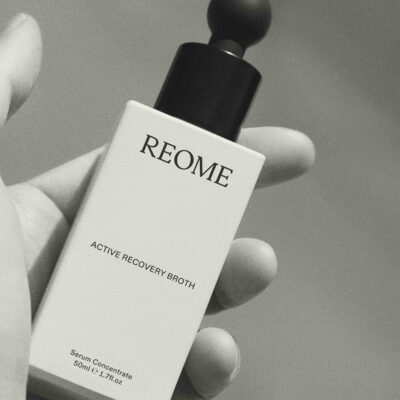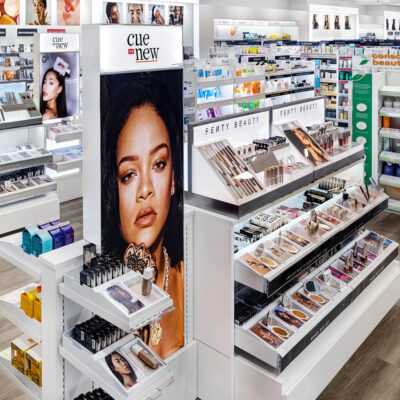
Where Retailers Stand On Mold Concerns Plaguing Clean Beauty
In recent weeks, mold allegations have dogged clean beauty brands.
On March 9, Soft Services took to Instagram to ask customers to stop using and discard Theraplush after the buzzy direct-to-consumer body care brand received four mold complaints from customers. It offered refunds for the popular overnight hand cream, but didn’t confirm if the mold complaints are accurate. Soft Services has ceased producing and selling Theraplush until it has “full confidence” the product won’t have a mold problem. Customers lauded the brand’s prompt response.
Soft Services’ headache follows mold allegations involving other clean beauty brands. Kosas’s bestselling Revealer Concealer has come under fire for growing mold and smelling like “crusty feet.” In response to the allegations, the brand directed customers and members of the press to a product FAQ section of its website. Additionally, it wrote on social media, “We use safe, effective preservatives and antimicrobial stabilizers which prevent against mold, yeast and pathogens.”
Amyris Inc., the biotechnology-focused parent company of JVN, determined that customers were confusing sediment in the brand’s product Complete Pre-Wash Scalp Oil with mold. On March 10, JVN assured consumers in an Instagram post that the scalp oil is “completely safe.” A number of commenters on the post praised the brand’s transparency. JVN is reformulating the scalp oil to address the sediment it explains forms due to turmeric interacting with hemisqualane, a lab-engineered version of silicone made by Amyris.
Retailers carrying clean beauty products are caught in the crossfire between consumers’ mold concerns and brands’ reactions to them. We were curious to hear their takes on clean beauty formulation challenges. So, for the latest edition of our ongoing series posing questions relevant to indie beauty, we asked seven clean beauty retailers the following questions: How should clean beauty brands respond to mold complaints, and do you think they will continue to happen? Has your business been affected by formulation snafus? If so, how did you handle it?
- Christina Ross Senior Scientist, Credo Beauty
Social media buzz around possible microbial contamination and recall events due to other safety concerns can serve to remind all beauty brands—not just clean brands—that we need to make sure products are properly formulated, packaged and preserved.
Clean beauty does not equate to a shorter shelf life or greater microbial risks than conventional beauty. The safety and stability of any cosmetic product, no matter who makes it, are dependent on proper formulation and usage.
Our Credo Clean Standard requires that our brands conduct preservation and stability testing. We also ask brands to follow good manufacturing practices (GMP). This is a system for ensuring products are consistently produced according to published quality standards. Credo is deeply committed to all aspects of product safety, and we work our partners closely on this.
We have brand consortium meetings with all of our brands in which we address important topics that our industry needs to work on or be aware of. Our next call is, in fact, on microbial safety and testing, preservative systems and formulation best practices because it’s an issue of safety and quality. The recent concerns in the broader industry serve as a great reminder to do the necessary work to prevent microbial growth.
Microbes are all around us in our daily life. Cosmetic products are usually applied directly on skin, which provides opportunity for microbes to be introduced into the product. This is why proper formulation, preservative systems and safety testing must to be a top priority for all cosmetic brands.
So, while it will likely happen to some product at some time, it is also something that brands can control for. Customers should note expiration dates and time that they’ve had the open product, and be good about disposing of products that are past their prime.
- Ashley Grabill Young Co-Founder, Fine Line
To me this issue all comes down to trust. Consumers trust brands and retailers to tell them the truth and hold themselves accountable to their values. They hold clean beauty to a higher standard because we hold ourselves to a higher standard. And we need to do everything we can to keep that trust intact, even if and especially when something doesn't go right.
Honesty, transparency, accountability and taking action to make it right—the same behaviors we expect in other relationships—can be applied here.
Soft Services took the right approach: Share the problem, take responsibility, make it right, and move on. Consumers are likely to purchase from them again because they prioritized their trust and didn't take their concern lightly.
I certainly think it's possible for issues like this to happen again. The type of preservatives used in clean products don't offer the same shelf life as mainstream products.
Similar to fresh produce and other items that can expire, everyone in the entire chain has to be diligent, from the person bottling the ingredients to the end consumer. Ask questions, look for expiration dates, be mindful of how long something has been open and of any changes in the product.
There's also an education component. A lot of people making the jump to clean beauty don't understand that there are some trade-offs such as a potentially shorter shelf life due to lack of certain preservatives that they might be used to in other products. Clean beauty has come a long way in the last five to 10 years, but there is still a great deal of innovation to be had to improve certain elements.
Knock on wood, we have not been affected by any formulation recalls. We were alerted to a misprint of the ingredients on the packaging of a product, but the brand offered to refund and replace the order right away. We offered the products to our team after explaining the mix-up so they wouldn't go to waste, but didn't feel comfortable offering them to customers.
I will add that, for small businesses, expiration dates become a big deal when brands ask us to purchase high quantities of each SKU. We see less foot traffic than a big-box retailer like an Ulta or Sephora so it can be difficult to move 12-plus units in a timely fashion. I recently had to throw away a small box of a certain product because we couldn't move it in quickly enough ahead of the expiration date. This can really add up to be a significant loss. So brands, when small businesses ask for smaller quantities, help them out!
- Jennifer Tinsley Founder, Field Botanicals
A lot has been said about how Kosas should react to claims of mold in their products, but how should brands be proactive against claims like these? There are several practices clean beauty brands should employ to protect themselves from claims regarding their preservation systems.
First, it's so important to have a comprehensive preservation system in place, especially for water-based products. Even as a clean brand, if your products are poorly preserved, then at some point there will be issues with contamination. If you're using clean or natural ingredients, you're working with more delicate and sensitive ingredients compared to synthetics, and these sensitive ingredients are extremely prone to oxidation and can have different chemical compositions even from batch to batch.
Brands need to be sure that their formulators have extensive experience in formulating clean cosmetics since cleaner preservative systems are often layers of single-focused anti-microbial, antibacterial and anti-fungal preservatives working together rather than a broad-spectrum preservative. Using airless packaging also provides a layer of security, and clean products should have outer packaging or dark or opaque containers. Second, clinical testing, including stability testing of each batch, should be standard GMP.
Third, brands need to make sure that the use directions and safety warnings on their labels are not only compliant with FDA regulations, but are explicit and easy to understand. This should also be addressed on a brand’s website FAQ page.
And, lastly, brands need to review their product liability insurance on an annual basis to make sure that they are adequately covered against such claims and potential recalls. Since smaller, more artisan brands may have limited resources to execute these controls, I think it will continue to be a problem.
Fortunately, we've not had any of these issues with our own products. However, we have had two instances of poor quality control with a couple of the brands we carried in our early years in retail. Both issues were with products oxidizing before end of shelf life. We had discussions with the brands regarding the issues and no longer carry them and, thankfully we caught the issue before selling the products to customers.
While we don't currently require stability testing data from brands, we do look closely at the preservative systems in place and are considering requiring stability testing data in the future.
- Jaleh Bisharat Co-Founder and CEO, NakedPoppy
These mold examples illustrate the importance of two practices that brands and consumers should take very seriously.
First of all, formulating with safe and effective preservatives is important, especially for any water-based product. Nobody should have to suffer bacterial infection from their beauty products.
Secondly, brands are responsible for proper testing such as preservative efficacy testing and microbial testing. Brands also need to educate consumers on proper storage, expiration and use of their products to limit any chance of contamination.
In terms of a formula issue affecting our retail business, I do have an example. About two years ago we discovered that a particular batch of a serum from a popular partner brand had been contaminated. While no adverse reactions had been reported at that time, we knew immediately that we had to reach out and warn our customers. Doing so led to one of the toughest few days of my career. We'd only sold a few units from the lot in question, but how would we know who had received the affected units?
As CEO, I personally emailed every single person who could possibly have purchased one of the units, asking them to check the lot number and to immediately discontinue use. While most appreciated the communication, the worst moment came when one customer said she could no longer trust us.
The story didn’t end there, however. After she cooled off from the initial shock, she let us know she appreciated the transparency and has remained a loyal customer.
- Melissa Lenberg Founder, Citrine Natural Beauty Bar
As clean beauty continues to evolve, I feel as though this will become less prevalent. I have worked in the beauty industry for over 20 years and have see this even amongst conventional brands.
With more innovation that comes on board regarding safe preservative systems and more education, I see this turning into a positive thing. Consumers will become more aware of the potential harmful preservatives and understand that, when they are opting for clean beauty, the shelf life may be slightly less.
Our clients appreciate our curation process in terms of the ingredients, and it hasn’t been an issue on our end. At the end of the day, it is all about education.
- Kathryn Dickinson Founder, Aillea
All beauty brands, not just clean brands, should always take the preservation and safety of their products incredibly seriously. Brands that have alleged issues should investigate the issue, do batch testing and assess: 1). Is there an actual issue? and 2). If there is an issue, they should recall/replace as appropriate.
That being said, there will always be human error attached to any product production. I know brands take many, many steps to ensure that problems do not occur, but sometimes small issues do occur.
Every retailer has had to deal with this. It’s rare, but it does happen. We have had products recalled due to bad pumps, lipsticks that have dried out, etc. People need to realize that, when dealing with all-natural ingredients, there will be variations from season to season and year to year on the different ingredients that can cause formulation variations or issues.
Every brand that we work currently work with has addressed the issue head-on, communicated the issue with us and refunded us completely for the products.
We had one brand that had repeated issues and wouldn’t address them. I no longer work with them. Customers are trusting us—the retailers and all of the brands—to act with the utmost integrity. They are coming to us for clean and effective products, and we need to be able to deliver that.
I have found the best thing to do is to be 100% honest and upfront with the customer what the issue is, and they are usually very understanding. Ninety percent of the time, it doesn’t have a big impact on us. As a retailer we are usually able to redirect customers to another similar product fairly quickly.
- Bryn Gabriel Co-Founder, See New Skincare
While we haven’t personally had this issue, if a significant number of individuals are reporting a comparable problem, it is evident that remedial action is necessary.
KraveBeauty should be commended for their proactive response to customer feedback, exemplified by their decision to withdraw a problematic product from the market and subsequently reintroduce it.
Similarly, in instances where a product garners attention on social media platforms due to concerns like mold, as was the case with Kosas concealer on TikTok, it is imperative to promptly remove the product from circulation and conduct a thorough reassessment for future use.
As a staunch advocate of the belief that some of the best products are the result of failures, I would eagerly await the relaunch of such a product.
If you have a question you’d like Beauty Independent to ask beauty retailers, please send it to editor@beautyindependent.com.






Leave a Reply
You must be logged in to post a comment.